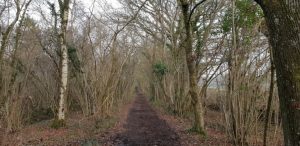
I know of no better method for guaranteeing a personal revelation than walking a pilgrimage. Even a short one of an hour or two will do. It must be why they’re booming as a spiritual practice. “Bring your own beliefs” is the strapline of the British Pilgrimage Trust, one organisation doing much to spread the word.
Pippa Evans and I have been working on how Perspectiva might adapt such walks to offer brief, felt introductions to our work of engaging with the soulful, social and systemic dynamics that so powerfully shape our lives. A half day pilgrimage through London, for example, is not just a way of learning about the city. It’s a way of learning how we might relate differently to the city.
That also means its about change in yourself. When we reconsider a place, our participation in its life shifts, and so does our life to some degree. The moment of encounter is a moment of reassessment and so also an adjustment of our connection with it.
Pilgrimages pack a lot of punch, but how do they work? In a word, it’s your body.
You commit to do a walk that will take you from one chosen place to another. This modest pledge shifts your consciousness just a bit from the everyday awareness of the mind to the often surprising awareness of the body. The effect is amplified by setting an intention for the walk – maybe it’s to glimpse something new about that tricky project or to hold in mind this dear person. Maybe it’s to see something new.
It’s knowing in a different way. There’s the pace of a pilgrimage; the walking pace that resonates with the heart. There’s being outdoors and feeling the elements on your face and the ground through your feet. There’s its perspective: turning a corner will unveil an atmosphere or render a familiar building unfamiliar.
This embodied knowing arises from feelings in your guts. It may be a slight modulation but the great thing about such interior swells and surges is that they touch your soul. Your inner vitality responds to the inner vitality of the moment. You may be uplifted by a handsome tree, puzzled by a ruin, intimidated by an imposing slope or wall. All bring a sense of meaning.
This soul element has to do with the kind of people or creatures who have inhabited that space, which is why embodied knowing also brings a different sense of society. That community may have flourished in a previous age and echoes back upon encountering a Roman wall or gothic arch. It may be contemporary and reflected in the shiny glass of an office. Or it may be strange: I recall first seeing that a stately beech tree was surrounded by younger beeches like courtiers around a monarch, and being told that they are the offspring of the mature tree who controls their growth through networks of underground communication. I never knew arboreal societies existed.
We also want to capture the third element that interests us at Perspectiva to see how pilgrimages offer an experience of the systems that shape places. If the soul is the inner life of a person or space, and the society is its outer manifestation, then the system might be thought of as the intersubjective element. It’s the dynamic third that the relates soul to society and society to soul; me to you and you to me. It’s the relationship between the two, which has a life of its own. This, too, can be experienced through embodied knowing.
When we tried out a short pilgrimage in London, we made one stop at the Bank of England and felt this systemic side. It has imposing walls and strange symbols on monumental doors that are presumably supposed to keep you out. We stood before it and asked what the experience invoked. We walked around it and saw it from another side. Is the bank there to serve us or to keep us in place? Who has access to it? Could we be invited in? Is it like a giant battery charging up the economy or a secret laboratory of monetary alchemy?
We could imaginatively feel into the “in between” dynamics of the place by testing out what it felt like to look at it head on, turn a back to it, stand together before it, move around it as if in search of a different side. The experience is not resolved for me but it has stayed within me.
Pilgrimages are powerful. In 2020, we hope to start offering our own short walks. We sense they will prove invaluable as a felt introduction to Perspectiva’s work, which is also an adventure. Because if pilgrimages reveal, they might also remake me and you.